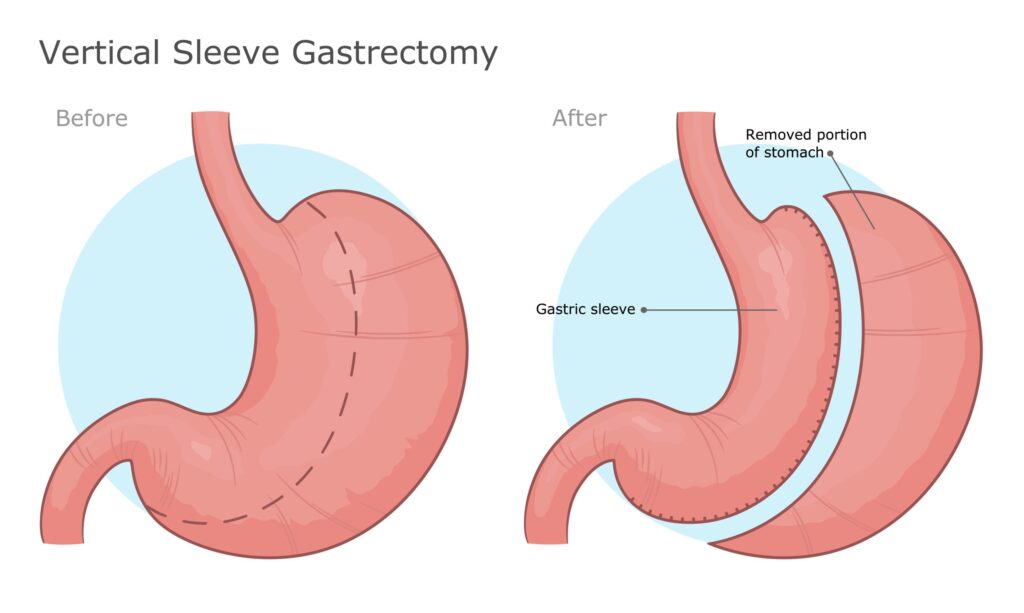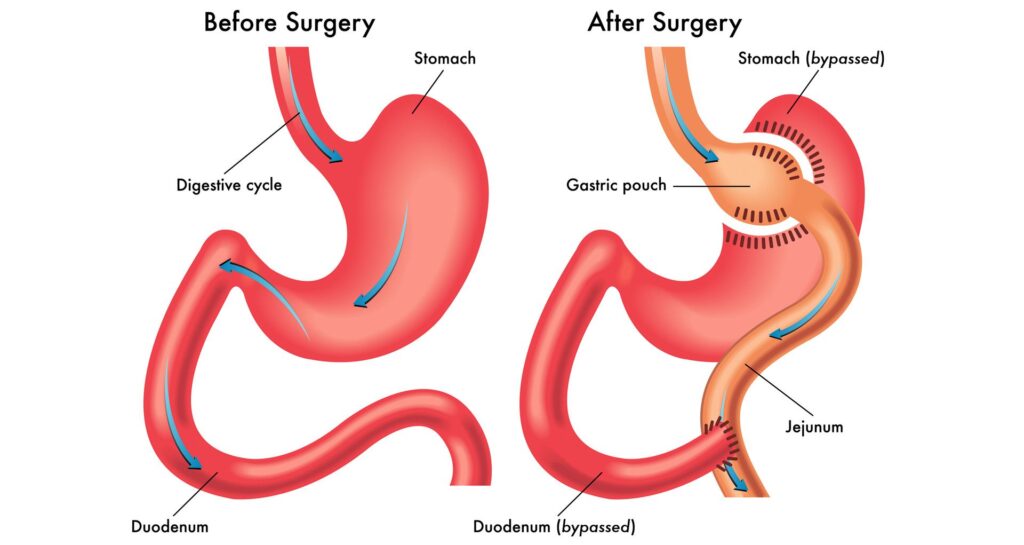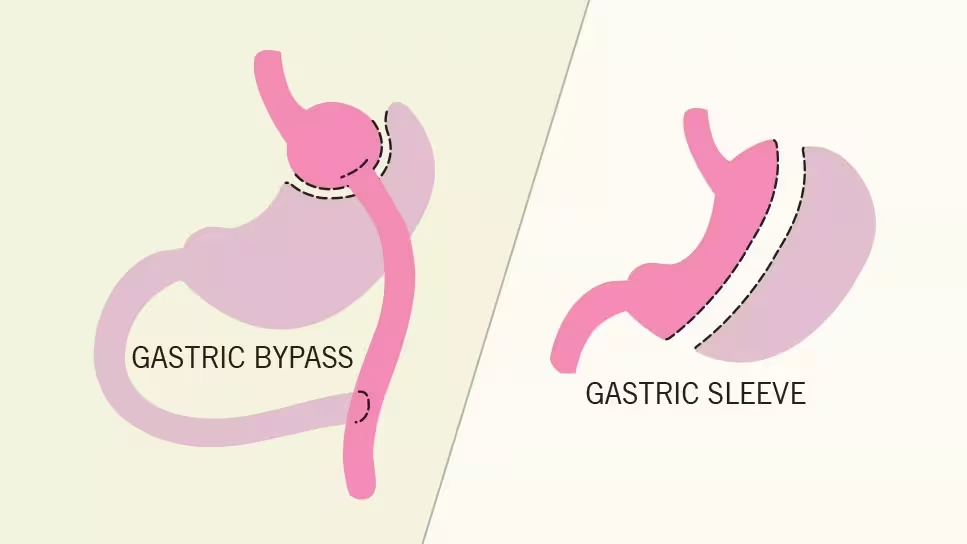Are you struggling with severe obesity and related conditions and looking for a reliable solution? Modern bariatric surgery offers safe and effective solutions for lasting weight loss. There are two standard weight-loss procedures, i.e., Gastric Sleeve and Gastric Bypass, that can transform lives by improving health and confidence. However, it is crucial to choose the right bariatric procedure to avoid potential risks and achieve lasting weight loss. In this blog, Dr. Will Johnson will provide everything you need to know about Gastric Sleeve vs. Gastric Bypass Surgery and how to choose the right weight loss surgery.
Understanding Gastric Sleeve Surgery
Gastric sleeve surgery, also known as vertical sleeve gastrectomy, is a weight-loss procedure that involves removing a significant portion of the stomach. This creates a smaller, tube-shaped stomach, reducing the amount of food a person can consume.
How it Works:
- It is typically performed laparoscopically through small abdominal incisions.
- The surgeon removes about 80% of the stomach, leaving a vertical sleeve.
- The remaining sleeve is then closed and sutured.
Benefits:
- Significant weight loss: Patients can expect to lose an average of 60% to 70% of their excess weight within 1 to 2 years.
- Improved metabolic health: Gastric sleeve surgery can improve conditions such as type 2 diabetes, high blood pressure, and high cholesterol.
- Reduced risk of certain cancers: The surgery may reduce the risk of gastric cancer and other cancers associated with obesity.

Understanding Gastric Bypass Surgery
Gastric bypass surgery is a weight-loss procedure that limits calorie intake and absorption by altering the digestive system.
How it Works:
- The upper part of the stomach is used to create a small pouch.
- The rest of the stomach is cut off from the pipe and stapled shut.
- Small intestine is divided and the upper part is connected to the pouch.
- The lower part of the small intestine connects to the stomach, while the middle part is bypassed.
Benefits:
- Moderate weight loss
- Improved metabolic health (blood sugar, cholesterol, blood pressure)
- Less risk of obesity-related diseases (heart disease, stroke, type 2 diabetes)

What are the Key Differences Between Gastric Sleeve and Gastric Bypass?
Some of the key differences between gastric sleeve and gastric bypass surgery include the following:
| Feature | Gastric Sleeve | Gastric Bypass |
|---|---|---|
| Procedure | Removes most of the stomach to form a smaller sleeve | Creates a small pouch and reroutes part of the intestine |
| Mechanism | Limits food intake and reduces hunger | Limits food intake and reduces calorie absorption |
| Weight Loss | 50–70% of excess weight | 60% to 80% of excess weight |
| Complications | Fewer risks and faster recovery | Higher risk of nutrient deficiency |
| Recovery | Shorter hospital stay and recovery time | Longer recovery period |
What Factors Should You Consider When Choosing the Right Bariatric Surgery?
There are several factors that you should consider when choosing the right bariatric surgery, some of which include the following:
Medical and physical factors
- BMI (Body Mass Index)
- Health Conditions
- Medical History
Goals and lifestyle
- Weight Loss Goals
- Lifestyle Habits
- Commitment
Surgical factors
- Procedure Risks
- Surgical Approach
- Surgeon and Center
What Dr. Will Johnson Recommends?
Dr. Will Johnson advocates tailored treatment for each person’s health, BMI, and goals.
- He carefully assesses factors such as pre-existing conditions, lifestyle, and long-term expectations before recommending any procedure.
- Gastric Sleeve may be the ideal solution for patients seeking a less invasive surgery with a faster recovery.
- Gastric Bypass typically results in greater weight loss and improved diabetes control, especially for those who need it.
- Safety, education, and long-term, sustainable results are truly the focus of his work throughout pre- and post-operative medical support.
Recovery and Results: What to Expect
- Most patients are discharged from the hospital after 1 to 3 nights, depending on the procedure chosen.
- The recovery after bariatric surgery is typically 2 to 6 weeks to return to your normal activities.
- Patients will follow a staged diet process, starting with liquids, then soft foods, and eventually solid foods as they heal.
- Most weight loss is typically noted in the first couple of months after surgery. Still, the total change, including the extent of weight lost or regained, is generally noted over the first 12 to 18 months.
Cost Comparison: Gastric Sleeve vs. Gastric Bypass in Atlanta, GA
Here is the cost comparison of gastric sleeve and gastric bypass in Atlanta, Georgia:
| Procedure | Average Cost (Atlanta, GA) | Inclusions |
|---|---|---|
| Gastric Sleeve | $12,000 to $18,000 | Surgeon’s fee, anesthesia, hospital stay and follow up visits |
| Gastric Bypass | $18,000 to $25,000 | Surgeon’s fee, anesthesia, longer hospital stay and post-op care |
Factors Influencing the Cost of Bariatric Surgeries
Here are some of the key factors that influence the cost of gastric sleeve and gastric bypass surgeries:
- Type of surgery
- Surgeon’s expertise
- Geographic location
- Hospital and facility fees
- Pre- and post-operative care
- Anesthesia fees
- Co-existing health conditions
- Complications
- Hospital length of stay
Why Choose Dr. Will Johnson for Bariatric Surgery in Atlanta?
Dr. Johnson is a leading bariatric surgeon in Atlanta, Georgia, specializing in advanced bariatric procedures, including gastric sleeve and gastric bypass. There are several reasons to choose Dr. Johnson for bariatric surgery, some of which include:
- Board-certified with extensive experience in advanced procedures
- Patient-centered approach and minimally invasive techniques
- Comprehensive medical care
- Exceptional patient outcomes
Conclusion
To sum up everything stated so far, the information on the topic “Gastric Sleeve vs Gastric Bypass” outlines the key differences between gastric sleeve & gastric bypass surgeries and how to choose the right surgery for you. This guide will help you choose the right bariatric procedure for effective, long-term weight loss.
If you’re also considering bariatric surgery but don’t know which procedure is suitable for you. Schedule an appointment with Dr. Will Johnson for personalized treatment plans and quality medical care. Visit our website today or contact us now by dialing (404) 854-4123.
People Also Ask Questions About Gastric Sleeve & Gastric Bypass Surgery
The key difference between the gastric sleeve and the gastric bypass procedure is that a large portion of the stomach is removed in gastric sleeve surgery, creating a banana-shaped pouch. In contrast, in gastric bypass, the stomach is divided into small pouches and connected directly to the small intestine, thereby bypassing a portion of the stomach and the small intestine.
Some risks associated with both surgeries include bleeding, infection, blood clots, and leakage from staple lines, and some long-term complications include malnutrition, hernias, and bowel obstructions.




